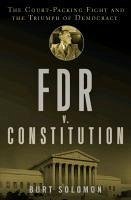In the wake of Franklin Delano Roosevelt's landslide re-election of 1936, the popular president-never anything but self-confident-unaccountably overreached. Deeply frustrated by a Supreme Court that had blocked many of his New Deal initiatives, FDR proposed to enlarge it from 9 justices to 15. The now-famous "court packing scheme" divided Roosevelt's own party and inflamed the country at large, and it failed-humiliatingly for FDR-because the president could persuade neither the public nor the Senate of its virtues. And yet, ironically, he could claim ultimate victory, for the Court that emerged from the revolution of 1937-its majority shifted from conservative to liberal-lasted for the next 68 years, until the recent Bush appointments have tilted it back. Historian Burt Solomon, deeply steeped in Washington's lore, skillfully chronicles one of the great set pieces in American history, illuminating the inner workings of the nation's capital as the three branches of our government squared off. The Supreme Court has generated many fascinating and dramatic stories, but none more so than that of the 168 days during which one of our greatest presidents attempted to outmaneuver the Constitution-an action that inevitably calls forth parallels with the present.





